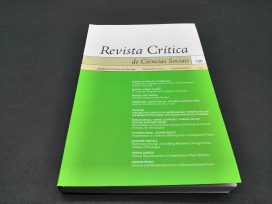Abstracts Revista Crítica 72 (2005)
Boaventura de Sousa Santos
The critique of neoliberal governance: The World Social Forum as subaltern cosmopolitan politics and legality
Governance is today presented as a new paradigm of social regulation that has come to supplant the previously established paradigm based on social conflict and on the privileged role of the sovereign state to regulate this conflict through the power of control and coercion at its disposal. In this article, the author presents a radical critique of the new paradigm, conceiving of it as a regulatory matrix of neoliberalism, seen as a new version of laissez-faire capitalism. Centred on the question of governability, this regulatory matrix presupposes a politics of law and a politics of rights that tend to aggravate the crisis of legitimacy of the state. Some aspects of governance may be found in the global movement of resistance against neoliberal globalization which finds its best expression today in the World Social Forum. Unlike hegemonic governance, this movement is grounded on the idea of conflict and struggle against social exclusion, and this is evident in the conceptions and politics of law that it adopts.
Dick Flacks
The question of relevance in social movement studies
The collaboration between Charles Tilly, Sidney Tarrow, and Doug McAdam has resulted in a conceptual scheme that now defines the main thrust of social movement studies. Their work has been useful insofar as it directed attention to the structural determinants of protest actions, by stressing the external opportunities, threats, and constraints that explain the emergence and development of movements. However, social movement studies have become increasingly “academic”, aiming especially at the refining of concepts and the testing of hypotheses. In this sense, work in this field has not only lost social relevance, but has also been neglecting fundamental intellectual questions, which include the sources of the power of movements and the motivations of activists. One way of recovering what is relevant and substantial is for scholars in the field to re-establish the dialogue with movement activists.
Benjamín Tejerina
Social movements, public space, and citizenship: The paths of utopia
This article addresses the relations established between social movements and processes of construction of citizenship by means of the physical and symbolic re appropriation and re signifying of public space. Studies of collective action have traditionally seen the public space as the site in which disputes for the legitimacy of collective demands take place. However, what occurs in the public space has a direct connection with private spaces, with private interests, and with the aggregation of these interests in social networks that link different entities: a kind of shared privacy that is made visible when political mobilization takes over the public space. The crystallization of demands formulated in this shared privacy leads to changes in the rights and responsibilities of citizenship, and this puts into question the limits of institutional(ized) politics.
José Manuel de Oliveira Mendes & Ana Maria Seixas
Collective action and protest in Portugal: Social movements in the mirror of the media (1992-2002)
This article presents an analysis of collective actions and protests that occurred in Portugal between 1992 and 2002. The authors¹ main aim is to understand in a more exact way the social and political configuration of protest actions, their development over time, their defining features, and the repertory of technologies used. The political effervescence and the high level of mobilization contradict the usual assertions about the weakness of civil society in Portugal. Since protest actions are strongly local, they argue that this localism can lead to a renovation of political involvement, based on participation and on the proximity of citizens to power structures, radically democratizing social and political life. The violence of many of the actions analyzed should not be read as a remnant of some primordial violence or of atavistic logics of political performance, but rather as a sign of the democratic maturity of Portuguese society. The centrality of school, in all its levels, in protest actions attests to the importance of education and educational capital in family strategies of social reproduction and mobility in Portuguese society.
Daniel Cefaï
The new protest movements in France. The articulation of new public arenas
This article gives a critical panorama of the emergence of the new protest movements (NPM) in France in recent decades. The author argues that, since the 1980s, the NPM have opened up new public arenas, following the transformations in the wage society and in public policy, and as a response to the growing globalization of economic, social, and strategic mechanisms. For those who invest politically in the NPM, the importance of their emergence lies in the rearmament of social critique and in the reconstitution of the radical left. Citizens, experts, and political decision makers have had to face new public problems, especially those related to illegal immigrants (sans papiers), the jobless, and the homeless, as well as issues of public health, ecology, and consumption. New collective actors, NGOs, and movements have become unavoidable partners and adversaries of public powers. However, the article calls attention to the danger of these movements slipping into institutional party politics, which would jeopardize the concerted action of the political left and the efficacy of its performance in both the national and the European context.
José Manuel de Oliveira Mendes
“Defeat happens only to those who stop fighting”: Protest and the democratic state in Portugal
In this article, the author seeks to understand how citizenship is constructed on the basis of the study of a local space strongly marked by collective mobilization. The case study is used to understand the dynamics of intersection of the analyzed community with the logics of control and power of the central state. He argues that the concepts of populism, bossism, Caesarism, and so on, reshaped by both media and political elites according to the demands of the democratic game, point to irrational behaviours and disqualify the capacity for political subjectification of persons and populations, suppressing the socio-political processes that may explain certain actions or representations in the field of politics.
Ana Maria Seixas
Learning democracy: Young people and protest in secondary education in Portugal
Based primarily on press reports and interviews with secondary school students, this article analyzes the three major protest mobilizations of secondary school students in Portugal since the 1990s: the protest against the General College Entrance Examination, in 1992, and against the Global Examinations, in 1994, as well as the movement against the Educational Policy and Curricular Reform, at the end of the 1990s and the beginning of the first decade of this century. The author seeks to understand the reasons why secondary school students protest, the motives and justifications they invoke, how they organize themselves and view their participation, at a time when education for citizenship is strongly emphasized.
Published 3 January 2006
Original in Portuguese
Contributed by Revista Crítica de Ciências Sociais © Revista Crítica de Ciências Sociais Eurozine
PDF/PRINTNewsletter
Subscribe to know what’s worth thinking about.



